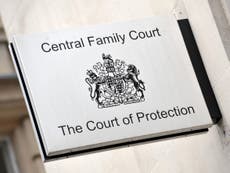Including parental alienation in legal definition of domestic abuse ‘places victims at great risk’
‘We risk handing perpetrators yet another tool for continuing coercion and abuse,’ warns London’s Independent Victims’ Commissioner

Your support helps us to tell the story
From reproductive rights to climate change to Big Tech, The Independent is on the ground when the story is developing. Whether it's investigating the financials of Elon Musk's pro-Trump PAC or producing our latest documentary, 'The A Word', which shines a light on the American women fighting for reproductive rights, we know how important it is to parse out the facts from the messaging.
At such a critical moment in US history, we need reporters on the ground. Your donation allows us to keep sending journalists to speak to both sides of the story.
The Independent is trusted by Americans across the entire political spectrum. And unlike many other quality news outlets, we choose not to lock Americans out of our reporting and analysis with paywalls. We believe quality journalism should be available to everyone, paid for by those who can afford it.
Your support makes all the difference.Including the “highly troubling” notion of parental alienation in the legal definition of domestic abuse would place victims subjected to violence by their partners at great risk, campaigners have warned.
Peers in the House of Lords - where the domestic abuse bill is being debated this week - have suggested an amendment to the landmark legislation which would include parental alienation in the definition of domestic abuse.
The Children and Family Court Advisory and Support Service identify parental alienation as “when a child’s hostility towards one parent is not justified and is the result of psychological manipulation by the other parent”.
But the concept of parental alienation has been discredited by many experts - with the World Health Organisation having recently dropped the notion from its index and classification.
Claire Waxman, London’s Independent Victims’ Commissioner, told The Independent she was “deeply concerned” by proposals to incorporate parental alienation into the statutory definition of domestic abuse.
Ms Waxman added: “The Ministry of Justice’s own report found that fears of parental alienation allegations are directly suppressing survivors and children from talking about their abuse. Parental alienation does not have an agreed definition or sound scientific basis and by enshrining this vague term, we risk handing perpetrators yet another tool for continuing coercion and abuse.
“The bill could make a greater impact by committing judges and other professionals working in the Family Courts to mandatory annual training on the complexities of domestic abuse so they are better equipped to make safe decisions around contact.
“The domestic abuse bill in its current form fails to protect children from the impact of domestic abuse and must be amended to remove the presumption of contact and to allow children’s voices and preferences to be safely heard.”
Peers spent four hours on Monday discussing the amendment to the domestic abuse bill which has been proposed by Baroness Meyer, Baroness Altmann and Earl Lytton as the legislation begins its Committee stage in the Lords this week.
Recent research found abusive men are winning time with their children by accusing mothers who have won custody of turning their child against them.
The study by Brunel University London found claims of so-called “parental alienation” are growing in the family courts, and this sometimes results in a child being transferred from their mother’s home to live with an abusive father. Allegations of domestic abuse are often not properly investigated and can even be seen by courts and professionals as “evidence” of parental alienation, the report found.
Dr Adrienne Barnett, who carried out the research, told The Independent she was concerned by the fresh proposals to include parental alienation in the domestic abuse bill.
Dr Barnett, who specialised in family law while practising as a barrister for more than 30 years, said its inclusion “could have far-reaching and unintended consequences which have not been assessed or tested by large-scale, generalisable national research or impact assessments.”
She added: “A range of studies conducted in a number of jurisdictions including the USA, Canada, Australia, New Zealand, Spain and Italy, as well as my own small-scale peer-reviewed research into reported and published court judgments, have raised concerns about the impact of parental alienation claims on survivors of domestic abuse and children involved in family court proceedings.
“It would be concerning if parental alienation, a concept with a questionable scientific base, were included in the bill without taking into account or even dismissing systematic, peer-reviewed research.”
The academic noted only two jurisdictions have criminalised parental alienation – Mexico and Brazil - as she explained concerns about the impact of this legislation on victims of domestic abuse have been raised in both places.
Dr Barnett added: “It would be helpful to draw on all this international experience before launching into legislation that may be detrimental to those the bill seeks to protect.”
Last week, the Court of Appeal examined how the family court protects victims of domestic abuse as leading women’s rights organisations warned outdated views of judges endanger survivors and their children.
The government launched a review last November looking at how the family court's approach to parental access affects the safety of children, with the findings set to be released this year.
Lucy Hadley, of Women's Aid, one of the largest domestic abuse charities, told The Independent they would be “extremely concerned” if the definition of domestic abuse incorporates concepts which do not have a “robust evidential basis”.
She added: “Parental alienation is increasingly used in the family courts, but there is a dearth of robust evidence to back up the concept or reliable data on its prevalence.
"The ‘pro-contact’ culture in the family courts means that parents are expected to facilitate contact, even if they have concerns about safety. It also means that allegations of parental alienation – where one parent is accused of encouraging their child to resist contact with the other parent –can be taken more seriously than allegations of domestic abuse and other forms of harm."
Parents can face fines or even jail sentences if they do not make sure their child sees an ex-partner on a supervised or unsupervised visit when court-ordered contact is in place.
Anne Neale, of Legal Action for Women, told The Independent absorbing the concept of parental alienation into the statutory definition of domestic abuse would “open the way for victims who this bill is supposed to protect to be criminalised and for domestic abuse to be decriminalised”.
She added: “Women who report violence - especially sexual abuse of children - not only could have their children removed, because their ex-partners accuse them of parental alienation, but could be prosecuted as perpetrators of domestic abuse.
“This is a patriarchal attempt to turn the clock back to a time when domestic violence and rape in marriage where a man’s right. Parental alienation is fast becoming the default argument of domestic abuse deniers against any woman who raises safety concerns and any child who refuses to have contact with a violent father.
“Parental alienation is not a form of domestic abuse, but is a misogynist tactic used by domestic abusers to continue perpetrating abuse their victim and children.”





Join our commenting forum
Join thought-provoking conversations, follow other Independent readers and see their replies
Comments